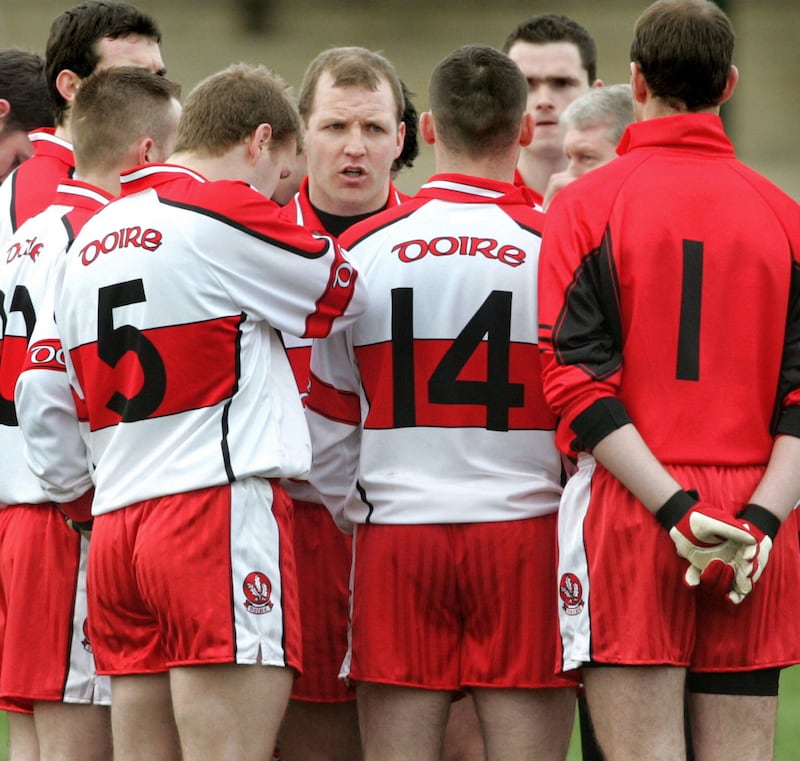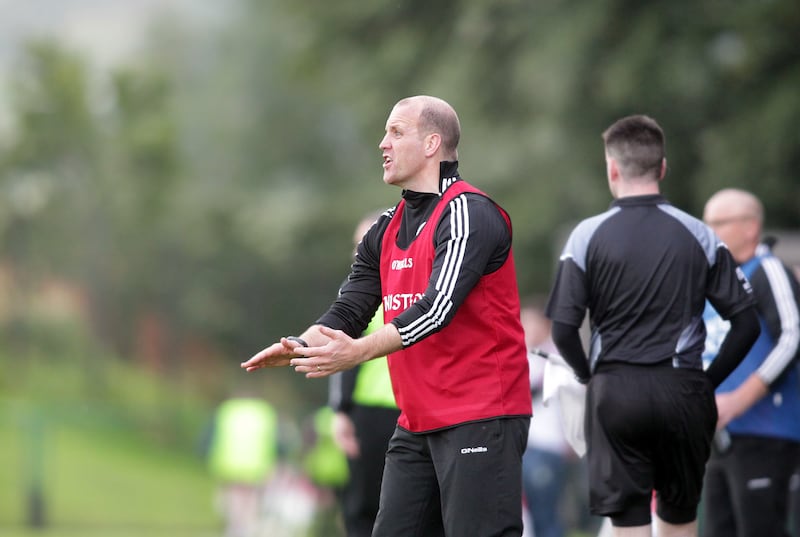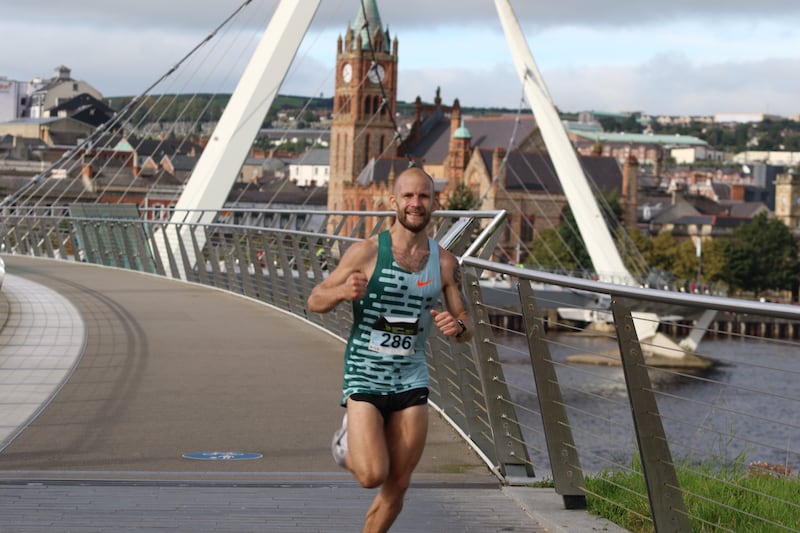Who’s that?... Galway?...
Is that Westmeath?...
Is that…
I’ve never seen this before.
JOHNNY McBride’s eyebrows clamp down hard as he realises what it is he’s been subjected to, sat in his own kitchen early on a Friday morning.
At first he mistakes it for the 2001 All-Ireland semi-final.
But as it rolls on, its significance dawns on him.
It’s the 1995 All-Ireland minor final. McBride, captain of the team, has just found a huge gap in the Westmeath defence. The clock has hit 60 minutes on the button. This is it.
There’s a man inside off to his left but if he breaks the tackle, the chance almost becomes a walk-in.
Westmeath lead by two points. Derry were huge favourites having already overcome a strongly fancied Galway team.
Shane Deering wore seven for Westmeath. His father Shay, grandfather Seamus and great-uncle Mark had all played international rugby for Ireland. On the last of his eight international caps in 1974, Shay Deering captained his country.
Read More
- Benny Tierney: Nothing puts the wind up Armagh like the old Down swagger
- Brendan Crossan: We love you Clones - but it's time to say goodbye
When McBride met Shane Deering, an All-Ireland was at stake. The tackle was no clumsy, desperate drag-down, Cavanagh on McManus style.
Shane Deering got his head in the right place. He made contact just above the left knee and wrapped his arms right around the Loup man’s lower legs.
The goal they needed is gone. There’s no black card then, no punishment of any sort. A note in Mick Curley’s book and away on.
Enda Muldoon’s free has the weight of heartbreak already attached, barely able to get off the ground, spinning harmlessly wide.
Westmeath captain Damien Gavin had stuck to McBride for every second of their 60 minutes in Croke Park.
While a disconsolate McBride is being lifted from the turf by his manager Chris Brown, Gavin is ripping the ball from the grasp of the referee and keeping it safely tucked under his arm until he gets to the Hogan Stand steps.
When the teams went for a meal together the following day in the Burlington, the four captains – including Dublin’s John O’Leary and Tyrone’s Ciaran Corr – sat together. All McBride could say was ‘I can’t believe yous beat us’.
“That is sore. At that age, it goes straight into your memory and it’s very hard to erase.
“An All-Ireland minor title is something you can put a stamp on and go back to it. You’re always going back to it.
“See that game, when you look back at that, psychology in sport has changed so much. If we had been in the right place mentally, that Derry team would have blew Westmeath away 99 times out of 100.
“That was a game we shouldn’t have been beat in. I think it got into the psyche that it was Westmeath and we’ll do enough.”
McBride kept hold of his speech. He had it off by heart, cupla focal and all, when Derry hammered Meath to win the U21 All-Ireland in Clones two years later.
________________________________________
OF all the good days in Johnny McBride’s career, his mind is incapable of ignoring the shortcut to the bad ones.
On Sunday afternoon, he’ll not know which road to take.
1998. Geoffrey McGonagle’s lean, Joe Brolly’s kisses, the final that should never have been played but the one that gave Johnny McBride his Ulster medal.
As jubilee winners they’ll be presented to the crowd in St Tiernach’s Park. Plans for the day started off innocently and progressed to meeting in Monaghan to get a bus.
“Then boys are saying sure why not just get a bus for the whole day?”
Whichever method of travel they settle on, there’ll be the ones that have got old and the ones that haven’t, the ones that have let go and the ones that are like rakes, and each will get their turn in the slagging.
“They’re clubmates of mine in a sense. You soldiered on and off for 15 years, with some of them from minors right through. There’s definitely good friends in that group.”
But ’98? Mixed emotions.
He’d been a starter the previous year in the Ulster final against Cavan, no less than in the full-back line marking Larry Reilly for the first while, and had been in the team for the league.
Brian Mullins dropped him for the championship opener against Monaghan.
Barring a few sub minutes that day, he didn’t get a look in again.
The only Ulster medal he has means very little. He doesn’t know where in the house it is, other than to say it’s definitely there.
It would be easier to locate the 2000 National League medal or the titles he won with The Loup. Not because of any club v county argument but because he was on the field when he won them.
“95 per cent of people are probably lying when they answer that question. When you’re playing….
“You look at Paddy Andrews and these boys that made careers out of it. Everything he says now, he probably wasn’t overly happy with it but he’s probably content with what he got out of it. They’re just not content not playing.
“You want to start. If you didn’t start back then, you didn’t take part. No matter what anybody says, it doesn’t mean the same.
“That’s why I understand how difficult it is for lads to buy into the panel ethos. Starting isn’t as big an issue as it was 20 years ago. Now you’re buying into the panel ethos, you have finishers instead of starters, and you can sell a lad the story ‘I need you there at the end’ and they can buy into that.”
Like thousands might feel on the road between Monaghan and Clones come two o’clock on Sunday, the shortcut is hard to resist.

________________________________________
THE natural first stop is at 2000.
His is one of the great forgotten Ulster final goals. The long diagonal ball towards Enda Muldoon breaks off. Ronan Rocks feeds the loose ball into the run. Benny Tierney hardly moves a muscle as McBride’s left-footed rocket from the 13’ cannons back off the stanchion inside the top left-hand corner.
Derry 1-11 Armagh 1-11.
In the 11 minutes of football that remain, Derry take five shots from their nine attacks.
Armagh hardly cross halfway. Oisin McConville takes their one shot, from a free right on the 45.
Derry 1-11 Armagh 1-12 it finishes.
Back-to-back titles for the Orchard, who would lose the All-Ireland semi-final after a replay to Kerry.
Although it was Derry who reached the last four the following season when the back door came in, Armagh were the ones that would lift Sam Maguire in 2002.
McBride ended up on Kieran McGeeney for most of that game in 2000. Ordinarily that year under Eamonn Coleman he was a third man out wearing 15, but somewhere it got converted that day.
“Me and Paddy Finn [Paul McFlynn] was talking about it one day there, we played Armagh in a challenge game one night, a real sunny evening over in Maghery or somewhere. There were fisticuffs in it.
“I dunno who was marking McGeeney but we were sorta going ‘get me outta that corner of that row!’ You just knew by him that he was powerful man.
“He wouldn’t have talked much but he didn’t take any shit. If you needed hit, you’d have got hit. He’d have played away and he played hard.”
Derry had lost McBride’s first Ulster final against Cavan in ’97, with Raymond Cunningham’s first-half shot that was flagged a score despite clearly having been well wide proving decisive for Martin McHugh’s side.
“That shouldn’t really be happening in Ulster finals. The shot wasn’t even close.
“That probably rankled more. That’s a game we probably shouldn’t have lost either. Cavan were on the crest of a wave, massive crowd, McHugh was the manager, Dermot McCabe and different ones had come in, first time they’d been there in a long time.
“But still we should have been beating them.”
An All-Ireland got away in 2001. Five points up in the semi-final against eventual winners Galway with 20 minutes to go, Derry capitulated and Matthew Clancy took it away.
There was another semi-final three years later but it wasn’t on the same chart at all. Kerry were miles ahead. The emptiness of Croke Park said all that needed to be said really.
“I don’t think we were well enough motivated at the time. It was a mixture of the end of the ’93 team and the joining of that [’95 minors], and I’m just not sure the boys my age were in the right headspace when I look back now.
“We had a lot of gifted players but we just didn’t have that ethos, we didn’t sit down and go ‘we can do this’.
“That Armagh group, that McGeeney group, there’s no doubt they were better tuned in.
“The first year I came in in ’95, you’re in complete awe. You’re a cub watching this for seven or eight years and next thing you’re sitting in a changing room with these men.
“But for a long period, to a certain extent, that left Derry. There was boys being asked to play for Derry and they’re saying no, and you’re thinking ‘you wouldn’t have been asked 20 years ago and now you’re turning it down’. It nearly was an insult to the jersey.”
After being named captain in 2006, McBride’s last year came sooner than expected. He quit at the end of that season, having just turned 30.
The Loup would go on to win a second club championship of that generation three years later to add to the county and provincial titles they’d won in 2003.
Johnny McBride loved playing for his county, loved playing for his club.
It’s just that his career coincided with more near misses than silverware.
He may not have been on the pitch in 1998 but there’s not a Derry fan that would say he deserved any less from his career than an Ulster medal.
When he’s presented to the crowd on Sunday, he’ll be worthy of every bit of it, no matter which back road his mind wants to take him.
________________________________________
THE other medal in the house is a National League medal from 1995/96.
The All-Ireland minor final was in September ’95 and with things in a bit of turmoil, McBride stepped in to make his debut against Kerry as a sub down in Ballinascreen.
“Stephen Stack just held on to me the whole time I was on the field.”
Had things turned out different, they could have been the managers of Derry and Kerry respectively.
McBride was in the running for the Oak Leaf gig four years ago, while Stack had built a fairly serious backroom team but lost out to the experience of Jack O’Connor.
Malachy O’Rourke, who built a huge rapport with The Loup players when he took them to an Ulster title in 2003, had him in with Fermanagh for a while. There was a year in Galbally before going back to play one last season.
In 2016, McBride became The Loup’s manager.

They went from nowhere to a county final but a bit of internal politics got to him and he stepped down a good bit after their loss to Slaughtneil.
“I threw the toys out of the pram a wee bit. If you asked me honestly about it now, that was a mistake I made in my football life.
“I should just have brushed it off and went on. I let myself down a bit and the players.”
Errigal Ciaran came calling ahead of the 2020 season. He had ambitions in management at the time and took it on. They lost out in an epic extra-time semi-final with Dungannon, ending their hopes of what was then an overdue championship.
But 2020 was a tough year. Away from football, he was dealing with watching his father’s health deteriorate until he passed away in August.
Alex McBride was a sheep farmer all his life at the foot of Slieve Gallion.
Right up until four months before he died, he was out at the land.
He’d been living for a few years with pulmonary fibrosis, a cruel disease that gradually thickens the walls of the air sacs in your lungs, starving the body and blood of oxygen over an often long and agonising period of time.
“The last three or four months, your body’s crying for oxygen, the lungs get that hard there’s no oxygen in your blood, whatever way it causes scarring of the tissue, and your oxygen levels keep dropping.
“All the time you’re obsessed with the wee finger thing [pulse-ox reader], it’s reading 50 and 60, we’re pumping him with oxygen.
“If I go into my home house, the only noise I can hear is those two wee machines. ‘What number is that at? Put that up to 15’. He needed the oxygen more and more. The last wee while, you become helpless.”
His best friend right through school was Declan Hegarty. He died of oesophageal cancer in April that year.
Johnny’s own father passed away in the August and then Mickey Hegarty, Declan’s father and Johnny’s “football man”, died of the same condition, pulmonary fibrosis, the following November.
Dr Josef Kuriacose was a popular doctor in Magherafelt who died of the same condition in April last year.
A group of his friends decided to raise some money in his name and were shocked to discover just how widespread its existence was in Mid Ulster.
There’s no cure, very little support for sufferers and their families and not much understanding at all of what causes it.
McBride has thrown his support behind the group, who hope to raise £150,000 to help fund a respite centre that would ease the suffering for patients unable to travel abroad due to oxygen requirements.
With all that going on in the background, it was a tough enough year up in Dunmoyle.
He hasn’t taken a team since and he’s not sure if he will again.
“It’s a serious commitment, whether it’s any involvement in a county setup or it’s a first division club team. You can’t be doing a full-time job now, it’s become impossible.
“The job I’m in [part-owner of an electrical goods company], basically unless I had a part-time role at work, there’s no way you could do that. That’s taken to the level, where I’m sitting here on a Friday morning, I’d need to be working on Derry and I’m not doing that, I’m taking calls from electrical contractors looking stuff.
“Is it something I would have liked to have done? Definitely, there’s no doubt. See that changing room environment, it’s the nearest thing a past player can get. Some people never want to see it again and other people say ‘that’s some environment to be in’.
“It got to the stage where I thought I don’t know if I need it. You see what’s involved in management and you’re going ‘I don’t really know if I want that’.
“I’m not saying I wouldn’t go help somebody coaching. I would never say never.
“But I’d need to be doing it very soon because you lose touch with it very quickly.”







